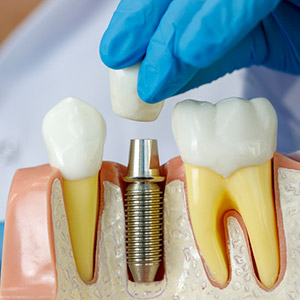
Losing teeth can make it more difficult to eat, not to mention the effect it can have on your smile. But that could be just the beginning of your problems. Missing teeth can contribute to extensive bone loss within your jaws and face. Here’s why.
Bone is like any other living tissue—cells develop, function and eventually die, and new cells take their place. Forces generated during chewing stimulate this new growth, helping the jawbone maintain its normal volume and density.
But you lose this stimulus when you lose teeth. This can cause a slowdown in bone cell regrowth that can eventually diminish bone volume. And it can happen relatively quickly: you could lose a quarter or more of jawbone width around a missing tooth within a year.
As this loss continues, especially in cases of multiple missing teeth, the bone can eventually erode to its base level. This loss of dental function can make chewing more difficult, place more pressure on the remaining teeth and adversely affect facial appearance. It could also prevent an implant restoration to replace missing teeth.
Dentures and other forms of dental restoration can replace missing teeth, but not the chewing stimulus. Dentures in particular will accelerate bone loss, because they can irritate the bony gum ridges they rest upon.
Dental implants, on the other hand, can slow or even stop bone loss. Implants consist of a metal post, typically made of titanium, imbedded into the jawbone at the site of the missing tooth with a life-like crown attached. Titanium also has a strong affinity with bone so that bone cells naturally grow and adhere to the implant’s surface. This can produce enough growth to slow, stop or even reverse bone loss.
This effect may also work when implants are combined with other restorations, including dentures. These enhanced dentures no longer rest on the gums, but connect to implants. This adds support and takes the pressure off of the bony ridge, as well as contributes to better bone health.
If you’ve lost a tooth, it’s important to either replace it promptly or have a bone graft installed to help forestall any bone loss in the interim. And when it’s time to replace those missing teeth, dental implants could provide you not only a life-like solution, but a way to protect your bone health.
If you would like more information on dental implants, please contact us or schedule an appointment for a consultation. You can also learn more about this topic by reading the Dear Doctor magazine article “The Hidden Consequences of Losing Teeth.”
